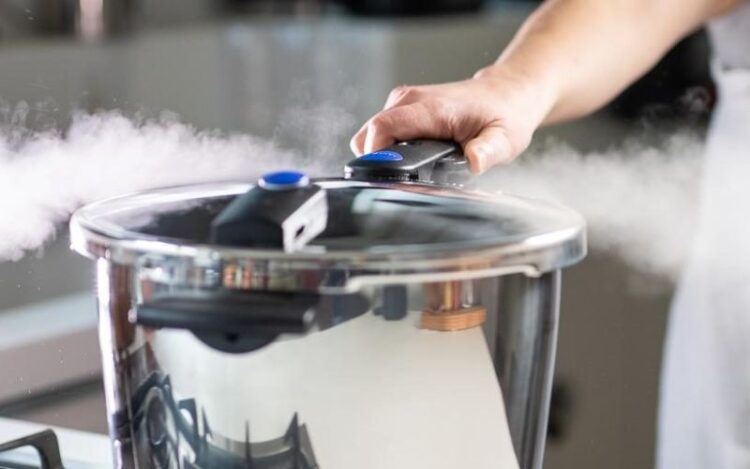When it comes to cooking, a pressure cooker has been a game-changer. It’s a pressure cooker with a steam release valve. This clever appliance not only speeds up cooking times, but it also prevents food from losing flavor or nutrients in the process. In this post, we’ll explore the origins, advantages, and workings of pressure cooking, and give you some helpful pointers on how to stay safe when using it.
History of Pressure Cooking
Denis Papin, a French physicist, introduced the notion of pressure cooking in the 17th century with his invention of the “steam digester.” Pressure cookers as we know them now did not gain widespread use, however, until the early 20th century. The first aluminum pressure cooker hit the market in 1938, bringing this time-saving cooking technique into the homes of ordinary people for the first time. Pressure cookers have developed throughout the years, with newer models boasting improved security and use.
Benefits of Using a Pressure Cooker
Health Benefits
The nutritional value of foods is said to be preserved more effectively with pressure cooking. Steam is trapped and water-soluble vitamins and minerals are preserved because of the hermetically sealed container. Vegetables cooked in a pressure cooker are less likely to lose nutrients than those cooked using more conventional methods, such as boiling. In addition, the shorter cooking durations mean that your food is exposed to lower temperatures throughout the cooking process, protecting its delicate flavors and textures.
Cost Savings
You may save money and improve your health by using a pressure cooker. In addition to decreasing energy use, the drastically shortened cooking periods also saved money. Additionally, water and energy expenses are reduced because less water is required for pressure cooking. Pressure cookers are the best friend of the thrifty cook since they instantly tenderize inexpensive cuts of meat. Tender, flavorful meals can be made using inexpensive materials.
Time Saving Features
The impressive time-saving abilities of pressure cooking are one of its most appealing features. When compared to the outcomes a pressure cooker can produce in a fraction of the time, traditional cooking methods can take hours. This means less time spent cooking and more time spent doing other things for people with busy schedules. If you want to eat healthier but don’t have much time to cook, a pressure cooker will alter your life.
How Does Pressure Cooking Work?
What is Pressure?
In pressure cookers, the water’s boiling point is raised by increasing the pressure. When water is heated inside a closed container and the resulting steam is unable to escape, internal pressure increases. Water boils at a higher temperature and at a faster rate when the pressure within the cooker rises.
Pressure Cooker Types
Pressure cookers can be divided into two categories:
Standard Models: These vintage pressure cookers include pressure and temperature controls that must be adjusted and monitored by hand. A weighted pressure regulator with a hissing and rocking sound to indicate pressure is included.
Modern Models: Digital controls, timers, and automated pressure release valves are just a few of the modern safety measures included on newer models. They’re simple to operate and provide you a lot of leeway in the kitchen.
Sealing and Unsealing the Lid
Make sure the pressure cooker cover is properly sealed before beginning cooking. The high pressure environment required for cooking is generated by a tight seal. Many contemporary pressure cookers feature a locking mechanism that verifies a tight lid seal with no effort.
Pressure and Temperature Regulating Outlets with Content
Pressure cookers typically feature vents via which the pressure and temperature can be adjusted. Both the main valve and the safety valve are designed to open when pressure builds up. To further lessen the likelihood of accidents, newer models have features like lid locks and pressure indications.
Tips for Using a Pressure Cooker Safely
Methods for Heating Up Without Leaking
Please adhere to the following safety measures to reduce the likelihood of harm:
Always make sure there is enough liquid in the cooker to create steam. If there isn’t enough liquid in the pot, it can overheat and break.
Never inflate your pressure cooker past its maximum capacity; doing so increases the risk of leaks and clogs.
Safely Releasing Pressure: Slowly opening the pressure release valve when cooking is done is recommended. Wait until the pressure has completely subsided before opening the cooker.
Conduct Post-Use Inspections on a Routine Basis
Always check your pressure cooker for damage after each use. Check for leaky gaskets, broken valves, and other malfunctioning parts. Preventative care keeps your pressure cooker operating smoothly and safely.
Conclusion
To sum up, the pressure cooker is a culinary miracle that helps you save time and money while also improving your health. Its long and illustrious history is steeped in scientific advancement, and it has revolutionized the way we cook. In order to make the most of your pressure cooker, whether it’s a classic or a newer model, you need to be familiar with how it works and how to use it safely.
A pressure cooker is an essential appliance in today’s kitchens since it allows you to prepare healthy, delicious meals in a fraction of the usual time. Do more with less effort and expense by maximizing the potential of your pressure cooker. Adopting this useful kitchen gadget will make you wonder how you ever managed without it.

